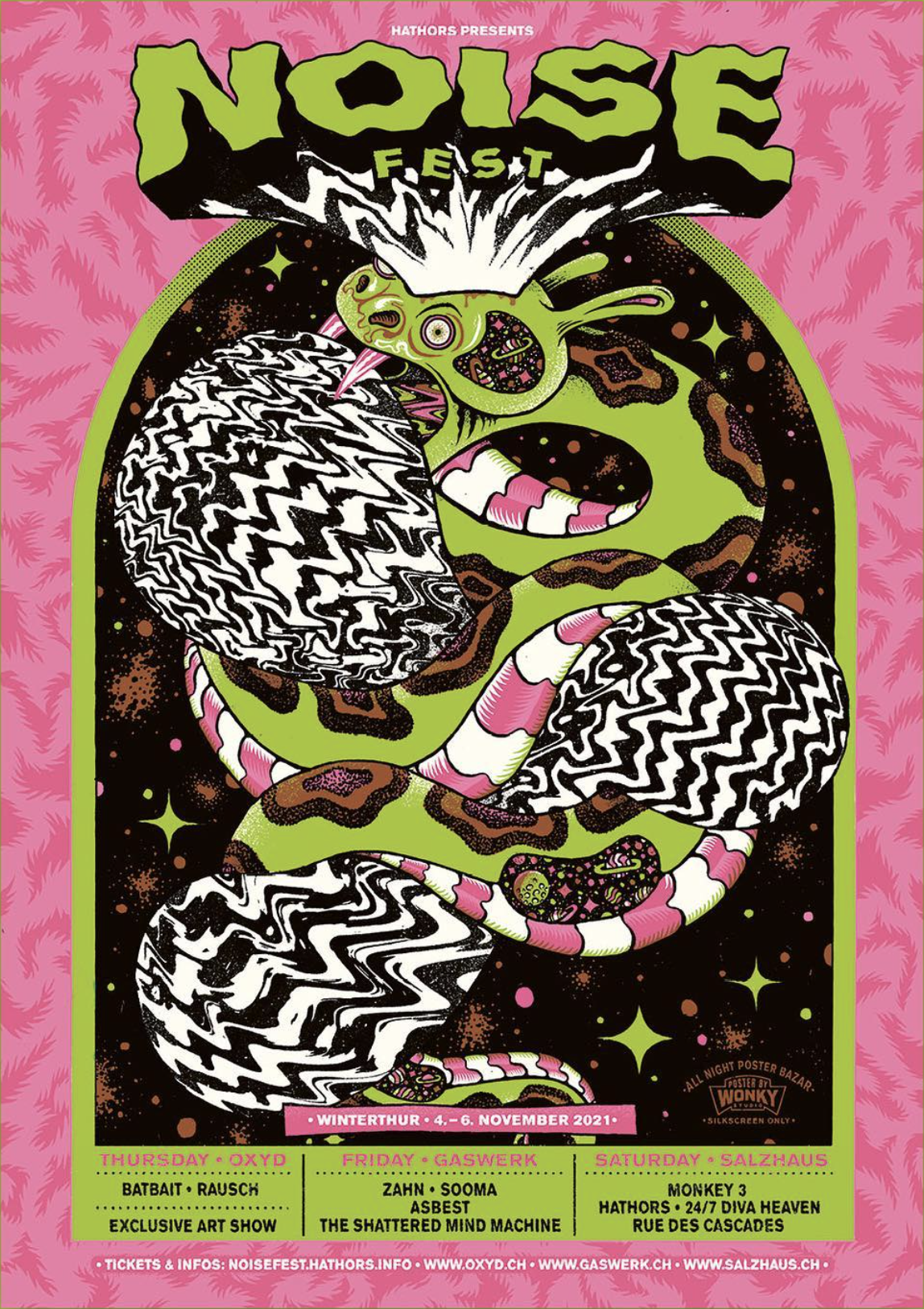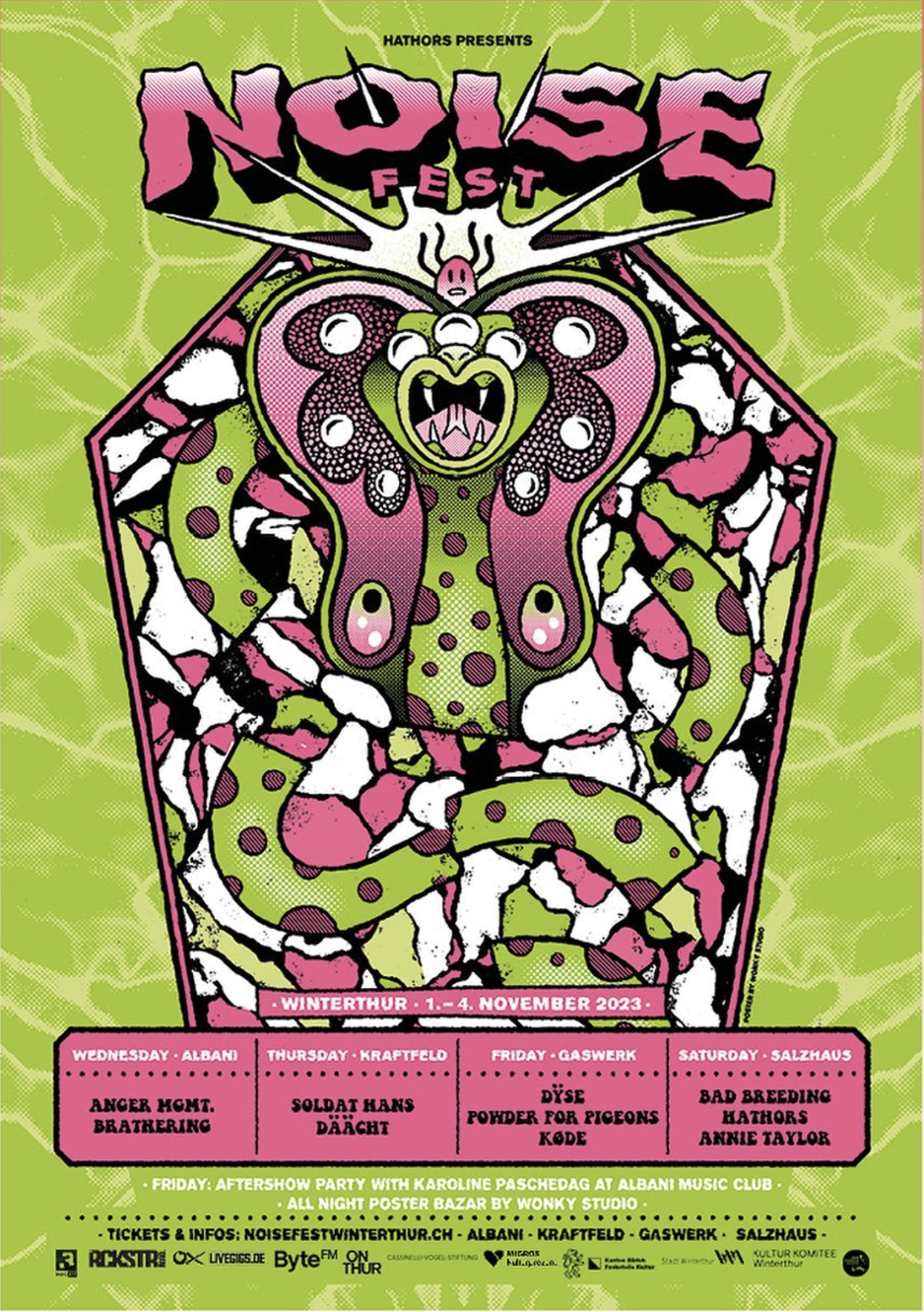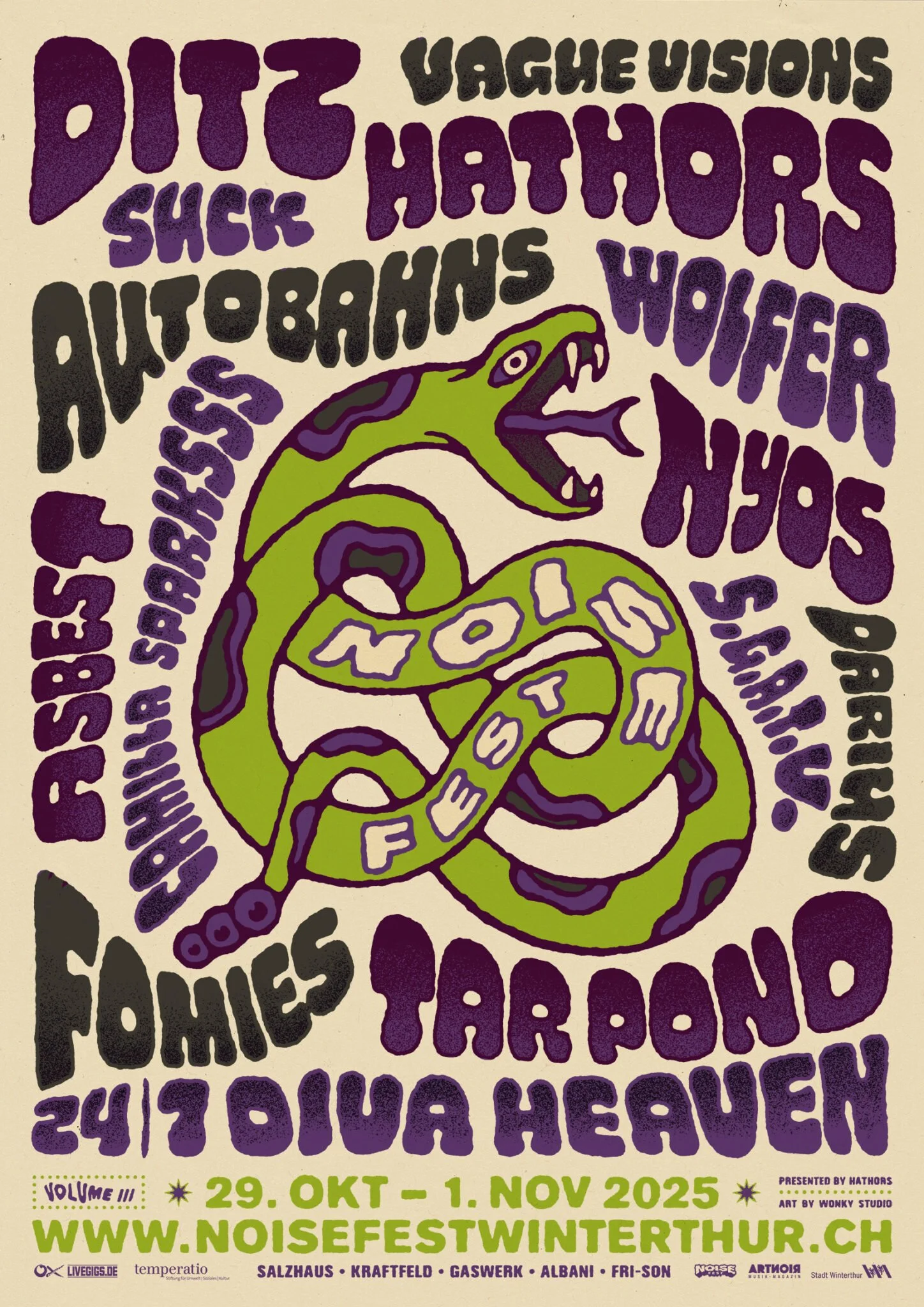Interview with NOISE FEST (curated by HATHORS)
Introduction
As soon as the first names for this year’s NOISE FEST were announced, I was interested straight away in knowing more about the festival.
Curated by HATHORS, there are four shows taking place in the band’s home town of Winterthur at the OnThur venues (Salzhaus, Gaswerk, Kraftfeld and Albani) from Wednesday 29th October until Saturday 1st November. This year also sees the festival introducing a show outside of the city at Fri-Son in Fribourg on the Thursday evening.
With many of bands having already been featured on the blog, plus enjoying the bands that I have discovered on the line-ups and with HATHORS’ latest album, When The Sun Is Out / When Skies Are Grey, on regular rotation at the moment, it made a lot of sense to do an interview about NOISE FEST.
As a fan of the Kombinat Festival and helping out with the Alles Post- MusikFest!, as well as hearing about many independent festivals across Switzerland, I am also interested in how they begin, what the previous editions were like and how they evolve.
Despite the incredible line-up, I probably won’t be there as the end of October is quite a special occasion for myself on a personal level but I hope you’re able to enjoy it for me or even if this interview helps you find out about the festival too!
I would like to thank HATHORS for their replies about the festival! More details can be found on the NOISE FEST website (and there are also some links at the end of the article).
(Photo copyright: Steve Gullick)
History
Who are you? Tell us about yourselves.
Marc: Hi, I’m Marc, the singer and guitarist of HATHORS, and I’m in charge of booking and communicating with the clubs at NOISE FEST. I record bands in our studio under the name Working Class Recordings, and I also invented the Flexi Recording Sessions, where we invited five bands and mixed them into four new constellations to write and record four songs within 48 hours. I also work for secaudio.ch, a pro audio dealer.
Domi: Hey, my name is Dominique. I play drums and sing backing vocals for HATHORS. At NOISE FEST, I’m responsible for finances and part of the promotion.
Sarah: Hello, I’m Sarah. I play bass and also sing backing vocals for HATHORS. This is my first NOISE FEST, and I’m in charge of the website, communication tasks, and some of the promotion.
Where did the idea come from to organise NOISE FEST?
Marc: A few friends of mine went to the Austin Psych Fest organized by the Black Angels, and they came back super psyched. I liked the idea of a festival curated by a band.
Years later, the festival was created during the pandemic, when we couldn’t tour. The first edition was intended to be HATHORS’ 10th anniversary, which we wanted to celebrate with our friends in other bands. What was originally planned as a one-day event turned into three days, followed by a second edition lasting four days. Now we’re on our third edition, which for the first time is also taking place in a city in western Switzerland.
NOISE FEST allows us, as a band, to present groups in our hometown that we got to know on tour and had a good time with—or that we are simply fans of. Some of them also invited us to play in their neighbourhoods, and with NOISE FESTt we can give something back. It’s also important to us to include newcomer bands in the line-up and to ensure that all genders are represented on stage. The festival is also intended to be a platform for the scene to network and make new friends.
Did you have experience organising festivals and concerts before NOISE FEST?
Marc: Before NOISE FEST, I was never involved in organizing a festival. I did organize a few DIY shows and tours in Europe for HATHORS, but that’s it.
Where did the concept come from to have the festival over several evenings?
Marc: At first, we thought it would be cool to have one week of loud guitar shows in Winterthur, starting on Monday in a record shop and getting bigger each day. But we had to admit that it would be too difficult to handle with limited capacity. So, for the first edition, we decided to start with three days.
How do you select the bands? Have you seen them live before? Are you already big fans through their records?
Marc: Since this is HATHORS’ festival, we book bands from our scene and bands we’ve met on tour throughout Europe. We also invite bands that have inspired us, some of whom are already touring at a higher level—like DITZ from the UK. For us, it’s very important to support newcomer bands as well. This year’s newcomer slot went to Vague Visions, a promising noise rock band from Winterthur and Zürich.
What are your roles in organising and bringing the festival together?
Marc: As curators of the festival, we select the bands, organize promotion, and also take care of the festival’s overall image.
Do you think that as musicians, it helps with organising and running the festival?
Marc: It helps, but it’s also very time-consuming. It’s a great gathering of like-minded people, and we love connecting the scene—whether it’s with bands, photographers, graphic designers, labels, booking agencies, radio stations, or any other media that want to be involved. It’s a great way to make new friends and contacts.


NOISE FEST I and II
How was the build up and the organisation to the first festival?
Domi: The festival was born during the pandemic, at a time when touring wasn’t possible. What started as an idea for HATHORS’ 10th anniversary celebration with friends from other bands quickly grew from a one-day event into a three-day festival.
What are your memories of the first festival?
Domi: The opening night on Thursday took place at Oxyd Kunstraum, where HATHORS hosted an evening that combined music and art. Zurich’s garage-pop band Batbait and Basel’s noise rockers Rausch performed, while an exhibition showcased HATHORS’ ten-year journey: record covers, posters, merchandise designs, props from video shoots, and video clips. It was an intimate and creative start to the festival.
On Friday, the focus shifted to Gaswerk with Zahn, a krautrock-inspired post-rock trio featuring members of Berlin’s Heads, and the live guitarist of Einstürzende Neubauten. They were joined by two powerful Swiss acts: Zurich’s noise rockers Sooma and local garage rock trio The Shattered Mind Machine. Together, they created a night full of energy and intensity.
The closing night on Saturday at Salzhaus featured a powerful lineup. Rue des Cascades opened the evening and impressed the audience with their experimental no-wave sound. They were followed by Berlin’s grunge trio 24/7 Diva Heaven, who turned up the energy before HATHORS took the stage. For us, it was a very special moment: we finally had the chance to present our album Grief, Roses & Gasoline live to the local audience. The record had been released during the first weeks of lockdown, but the release show was postponed several times — and that night, it finally found its well-deserved stage. The evening reached its peak with Lausanne’s stoner rock legends Monkey 3, who closed the festival with an unforgettable performance.
What were your highlights?
Domi: The whole festival was a highlight in itself – the atmosphere was fantastic, and the concerts really spoke for themselves.
How did it feel once it finished?
Domi: The first NOISE FEST was a real success, and it felt amazing to create something that brought together the alternative rock scenes from Switzerland and Germany. Right after that first edition, it was clear to us that there had to be a second one — and that we wanted to take the festival to the next level.
The second festival saw you go from three to four nights, how did that change happen?
Domi: The first festival was more of a trial run, and when it turned out to be such a success, we knew the second edition had to grow. That’s how the idea came about to spread it across four evenings and four venues.
(photo copyrights: Mehdi Benkler)
It also saw all the concerts take place at the ONTHUR clubs in Winterthur. How does it make you feel to work with all four of the venues?
Domi: The ONTHUR clubs — Albani, Gaswerk, Kraftfeld, and Salzhaus — have been shaping Winterthur’s cultural and music scene for more than 25 years with great passion. Bringing the festival into these clubs felt like a natural fit and a real win-win for everyone involved.
What other differences did you make from the first festival? What had you learned from the first edition?
Domi: With every edition, we learn something new. For the second festival, for example, we stepped up our advertising, brought media partners on board, and got more helping hands for things like filming or selling NOISE FEST merchandise exclusively during the four evenings. Of course, the bigger the festival gets, the more challenging the organization becomes.
What are your highlights and memories of the second festival?
Domi: The second edition of the festival took place from November 1 to 4, 2023, and turned out to be a real highlight. The kick-off at Albani set the tone perfectly: Brathering from northern Germany and Switzerland’s Anger MGMT. brought incredible energy to the stage, immediately drawing the crowd in and creating great anticipation for the days ahead.
On the second evening, the festival continued at Kraftfeld, where Däächt from Regensburg joined forces with local heroes Soldat Hans. Their mix made for an explosive night – the audience was fully engaged, celebrating the intense performances well into the night. The third evening at Gaswerk kept the momentum going. With KØDE from Lausanne, Powder for Pigeons, and the German duo DŸSE, the atmosphere was electric. The venue was packed, and the energy reached its peak when DŸSE closed the night with an unforgettable performance.
The grand finale took place at Salzhaus: Annie Taylor from Zurich, HATHORS from Winterthur, and Bad Breeding from England delivered powerful sets that captivated the audience and rounded off the festival with lasting impressions. Overall, NOISE FEST Vol. II offered four evenings full of energy, diversity, and unforgettable moments – a clear step forward in bringing both international and local talent together.
NOISE FEST III
How did it come about to work with Fri-Son?
Marc: We know the booker from Fri-Son, and they asked us if we wanted to partner up for the third edition. Fri-Son is one of my favorite venues in Switzerland, where I’ve seen bands like Fantômas Melvins Big Band, Shellac, etc., so that decision was a no-brainer.
How did you decide to choose Fribourg as the second location?
Marc: They chose us.
What do you think about the town (musically and non-musically)?
Marc: Fribourg is a nice little city with a great small scene. It’s the home of one of my favorite Swiss bands, The Young Gods. Next to Fri-Son, there’s also the Bad Bonn venue in Düdingen, a small club in the countryside. They also organize the Bad Bonn Kilbi, probably the most important festival for experimental and independent music in Switzerland.
Sarah: To be honest, I’ve mostly been to Fribourg when attending a concert at Fri-Son or while in a recording studio. During those short visits, I perceived the city as open and diverse, which I find very appealing. For the alternative music scene—if there is such a thing—the location is certainly very central and important. From my point of view, many great bands and artists are emerging from this region.
How does it feel to have the four ONTHUR clubs involved again?
Marc: It’s great to work with four clubs that cooperate with each other. This makes things easier for us when it comes to local promotion.
What changes can we expect from the previous festivals?
Sarah: There’s a new evening at Fri-Son, so Thursday will run in parallel in Fribourg and Winterthur. Other than that, we’re looking forward to lots of great live music and meeting people who also enjoy loud guitar bands.
Which bands are you most looking forward to seeing live? Are there bands you haven’t seen live yet and are excited to see at this year’s festival?
Sarah: The line-up for NOISE FEST Vol. III is very exciting and is sure to offer lots of inspiring live moments. I’ve already seen some of the artists live once or several times, like Asbest and Wolfer, but others I haven’t seen yet. Of course, I’m looking forward to all the bands!
For those who haven’t been to NOISE FEST (yet), how would you describe the atmosphere?
Marc: I’d say our audience is very chilled and respectful. It’s important to us that everyone feels comfortable and safe at NOISE FEST. Each club has an awareness team in case somebody feels harassed.
How does it feel to see the festival continue to grow, especially taking place in your hometown of Winterthur?
Marc: Since we’re connected to the local scene in Winterthur and know most of the people from the venues personally, it makes organizing a festival much easier than starting from scratch in an unknown city. Otherwise, we couldn’t pull it off in a timely manner. It’s great to see the festival grow, but it’s also challenging and takes us out of our comfort zone.
What are your thoughts on the music scene in Winterthur and in Switzerland?
Marc: I’m happy with the scene here. It’s small and manageable. We have great venues, great festivals, talented artists, and financial support from foundations. Of course, we can’t compare the Swiss scene to the one in England, France, or Germany, because we’re a tiny country and don’t have cities with a rock ’n’ roll history like London or Berlin. It’s important to connect with people abroad because, for a noise rock band, a tour in Switzerland is probably maxed out after 4–5 shows. However, I sometimes wish that music would finally be recognized as an economic sector by the Swiss government, as it is in certain Scandinavian countries.
Anything else you would like to add?
Thank you so much, Reverb Dream, for having us and supporting our festival. We appreciate it a lot. And to everyone reading this interview: come say hi and bring your friends!
Links:
NOISE FEST:
HATHORS:
Related articles:
Four memorable concerts from local bands: Zurich (feat. Vague Visions)











